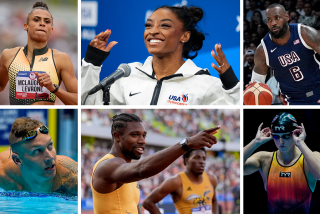Soccer Stars Encounter Road Bump
If Cristiano Ronaldo, Luis Boa Morte and Tiago Mendes are awarded gold medals on Aug. 28 at the end of the men’s Olympic soccer final in Athens, the three Portuguese players will have overcome the disdain and extraordinary prejudice of their respective club coaches in England.
The Olympics overlap the start of the European soccer season, and clubs, especially the big-name clubs in Britain, have fought to keep their players from going to Athens and playing in the 16-nation tournament.
Ronaldo, for example, plays for Manchester United, having been acquired last year at age 18 from Sporting Lisbon for $19.7 million.
United Coach Alex Ferguson tried hard, but failed, to prevent the winger from taking part in the Olympics. He said he feared burnout because the teenager already had helped Portugal reach the final of Euro 2004 this summer.
“When you cut a cake up too many times, there is nothing left,” Ferguson told Agence France-Presse. “Next season, the boy may be exhausted.”
But Ronaldo was insistent and would not back down.
“Playing in the Olympics is a once-in-a-lifetime opportunity in the career of a football player,” he told reporters in Lisbon, adding that Ferguson was simply “defending his interests” and that it was “only natural that he wants me to play for Manchester.”
Boa Morte, meanwhile, plays for Fulham, and the London club’s Welsh coach, Chris Coleman, was equally as dismissive of the Athens Games as his Scottish colleague Ferguson.
“I didn’t want him to go to the Olympics, but I have to accept his wishes,” Coleman said of Boa Morte. “There is nothing we can do about it except hope that Portugal gets knocked out in the first round.”
Tiago, 23, will soon be playing for Chelsea, which opens the English Premier League season on Aug. 15 against Manchester United. He was signed from Benfica in July for $18.5 million.
“Portugal has lots of good young players,” Chelsea’s new Portuguese coach, Jose Mourinho, told England’s Evening Standard. “I don’t think the Olympic Games ... is good for his career.”
Tiago told the same newspaper that he would like to forgo the Olympics.
“I would like to stay with Chelsea,” he said. “It feels good to be a Chelsea player, to wear this blue shirt, and I want to play for them.”
But as Gilberto Madail, president of the Portuguese soccer federation, pointed out to the Portuguese newspaper 24Horas: “It is strange that he did not adopt that position while he was still a player with Benfica.”
The inference was clear: Pressure had been applied by Chelsea officials.
Under international soccer rules, clubs cannot prevent players from participating in FIFA-sanctioned international events such as the Olympic Games. That does not mean coaches don’t try to persuade players to turn down the opportunity.
Ferguson, for example, did some not-so-subtle arm-twisting on another of his players, defender Gabriel Heinze, who was acquired this summer from Paris Saint Germain for $12.5 million.
Heinze plays for Argentina and started on the team that reached the final of the Copa America in Peru. He is highly regarded by Ferguson.
“The left-back position was his,” Ferguson said, purposely using the past tense. “But at the start of the season, I’m going to have to have someone else in there if he is at the Olympics.
“He could find it difficult to get into the team. In fact, he may never play a game for Manchester United.”
Alex McLeish, coach of the Glasgow Rangers in Scotland and, oddly enough, one of Ferguson’s former players, went to even greater lengths to prevent one of his team’s players from going to Athens.
When Ranger defender Craig Moore announced that he would play for Australia in the Olympics and would miss the beginning of the Scottish season, McLeish dismissed him as team captain and placed him on the transfer list, meaning that other clubs were free to sign him.
That brought an immediate rebuke not only from Sepp Blatter, the president of FIFA, but also from John Howard, Australia’s prime minister.
“To participate in the Olympic Games is an honor for the player and it should be an honor for the club,” Blatter said.
Britain is not the only place, however, where would-be Olympians are being forced to choose between club and country. Other clubs in Europe are ignoring FIFA’s rules and some Olympic teams are not fighting back.
Red Star Belgrade, for example, has refused to release some of its players to play for Serbia and Montenegro, whose coach, Vladimir Petrovic, is not forcing Red Star’s hand as he could. Instead, he is making pre-Olympic excuses.
“The Olympics are coming at a very bad time for us because our players have commitments with their foreign and domestic teams in European competition,” Petrovic said. “I cannot gather the best team for the Olympics.”
In the end, it might not make any difference.
On paper, the tournament, which is being played not only in Athens but also in the Greek cities of Thessaloniki, Volos, Patras and Heraklio, should come down to four teams: Argentina, Italy, Portugal and one wild card.
The wild card could be Mexico, whose coach, Ricardo Lavolpe, has stuck largely with the team that looked impressive while ousting the United States, 4-0, during regional qualifying.
It could be South Korea, which has included World Cup 2002 players Yoo Sang-chul and Song Chong-gug on its squad.
It could be Paraguay, which was fielding its Olympic team when it defeated eventual champion Brazil in the first round of the Copa America.
As for the rest, the odds are slim.
Two African teams, Nigeria and Cameroon, won the gold at Atlanta in 1996 and Sydney in 2000, respectively, but neither qualified this time. Instead, Africa’s challenge comes from Ghana and even more lightly regarded Mali, Morocco and Tunisia.
The presence of Iraq makes for an interesting story but not much more, and Australia, Costa Rica, Japan and Serbia and Montenegro are nowhere near the same level as the three favorites.
And then there is host Greece.
If the Greeks could win the European Championship in Portugal, then it is certainly conceivable that the Portuguese could return the favor and win the Olympic title in Greece.
Ronaldo, Boa Morte and Tiago would like that scenario, if only to flash the gold when they return to their unhelpful English teams.
But chances are this is Argentina’s tournament to lose, with only Italy, the under-21 European champion, posing a significant threat to the South Americans’ hopes for a first soccer gold medal.
*
(BEGIN TEXT OF INFOBOX)
MEN’S SOCCER GROUPS
Group A: Greece, Mali, Mexico, South Korea
Group B: Ghana, Italy, Japan, Paraguay
Group C: Argentina, Australia, Serbia and Montenegro, Tunisia
Group D: Costa Rica, Iraq, Morocco, Portugal
Note: Top two teams from each group advance to the quarterfinals.
*
GOLD MEDAL WINNERS
*--* 1900: Great Britain 1956: Soviet Union 1904: Canada 1960: Yugoslavia 1906: Denmark* 1964: Hungary 1908: Great Britain 1968: Hungary 1912: Great Britain 1972: Poland 1920: Belgium 1976: East Germany 1924: Uruguay 1980: Czechoslovakia 1928: Uruguay 1984: France 1932: No tournament 1988: Soviet Union 1936: Italy 1992: Spain 1948: Sweden 1996: Nigeria 1952: Hungary 2000: Cameroon
*--*
* Competition not considered official by International Olympic Committee.






